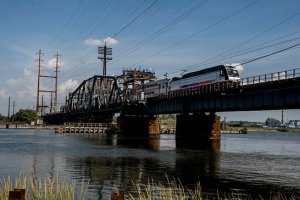
NJ Transit train crossing the Portal North Bridge. Photo: Adam Elmquist, Bridgehunter.com #257886
First of its kind effort made possible through President Biden’s Bipartisan Infrastructure Law establishes a national cluster of experts dedicated to developing the future workforce while advancing the safety, efficiency, and reliability of rail transportation.
The U.S. Department of Transportation’s Federal Railroad Administration (FRA) recently selected the University of Illinois Urbana-Champaign (UIUC) to lead its inaugural Rail Research and Development Center of Excellence (CoE) program.
The $5 million grant will establish the National University Rail Center of Excellence (NURail CoE), a pioneering initiative dedicated to developing the future workforce while advancing research and expansion that enhances the safety, efficiency, and reliability of both passenger and freight rail transportation.
Led by the University of Illinois Urbana-Champaign, the NURail CoE comprises a consortium of nine partner institutions, including Rutgers Center for Advanced Infrastructure and Transportation (CAIT), University of Delaware, Kansas State University, Michigan Technological University, Morgan State University, University of Texas at Austin, and Tuskegee University.
“This summer, I had the chance to visit the Urbana-Champaign area to celebrate investments we’re making there to improve railroad safety,” said U.S. Transportation Secretary Pete Buttigieg. “Today, we are proud to provide UIUC with funding to establish the National University Rail Center of Excellence, which will pursue pioneering research and innovation to make railroads safer across the country.”
Representing the NY/NJ region, Rutgers CAIT is a leader in rail education and research across the Northeast. CAIT is home to the North American Regional Training Center in collaboration with NJ TRANSIT and UITP, providing high-level courses on rail maintenance, electric buses, and other topics for transit agencies and their employees.
Rail researchers at CAIT are leading cutting-edge research projects developing an AI-based trespassing detection system for grade crossings to prevent fatalities, building a Track Information Management System (TIMS) for managing track infrastructure data and to improve safety, and investigating the use of advanced sensing technologies to improve infrastructure and operational safety.
“Freight and passenger rail in the U.S. are critical lifeline systems that connect communities throughout the country, providing people with essential mobility options and access to goods, employment, medical care, and more,” said Dr. Xiang Liu, associate professor and director of the Rutgers Rail and Transit Program at CAIT. “This new center represents an opportunity for our rail systems to become more connected, intelligent, safe, and efficient—Rutgers CAIT is proud to work with UIUC and our academic partners on this critical initiative.”
The NURail CoE is set to operate for a three-year duration, allowing ample time for the pursuit of transformative rail solutions and innovations that will contribute to a safer and more modern rail network across the country.
“The establishment of the NURail CoE is a testament to the dedication and expertise of these institutions,” said FRA Administrator Amit Bose. “This initiative exemplifies our ongoing commitment to building a safer, more efficient, and sustainable rail network for the benefit of all Americans.”
The center will appropriate its resources towards research areas encompassing a wide range of critical topics. Potential research topics may include:
- Developing new technologies to advance rolling stock
- Positive Train Control systems
- Rail infrastructure enhancements
- Grade crossing safety innovations
- Trespasser prevention strategies
- Energy efficiency measures
One of the main efforts across all consortium members within the National University Rail Center will be developing programs to introduce minority and women scholars to the different facets of rail transportation and provide pathways for them to begin rail facility careers, UIUC said in a news release.
“The U.S. is home to the largest, safest, and most cost-efficient freight rail network in the world,” said CAIT Director Dr. Ali Maher. “This critical system supports our national economy, provides more than 100 thousand jobs, and reduces congestion and greenhouse gas emissions across the transportation sector. CAIT and this consortium of leading universities will work closely to further strengthen our nation’s freight network and to deploy new solutions that enhance safety, resilience, and the state of good repair.”

